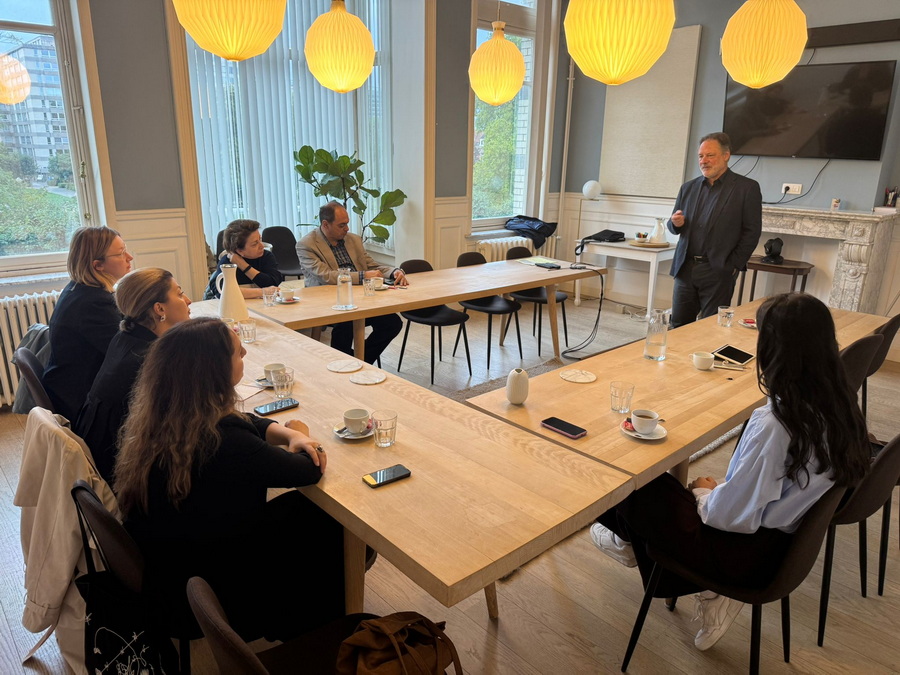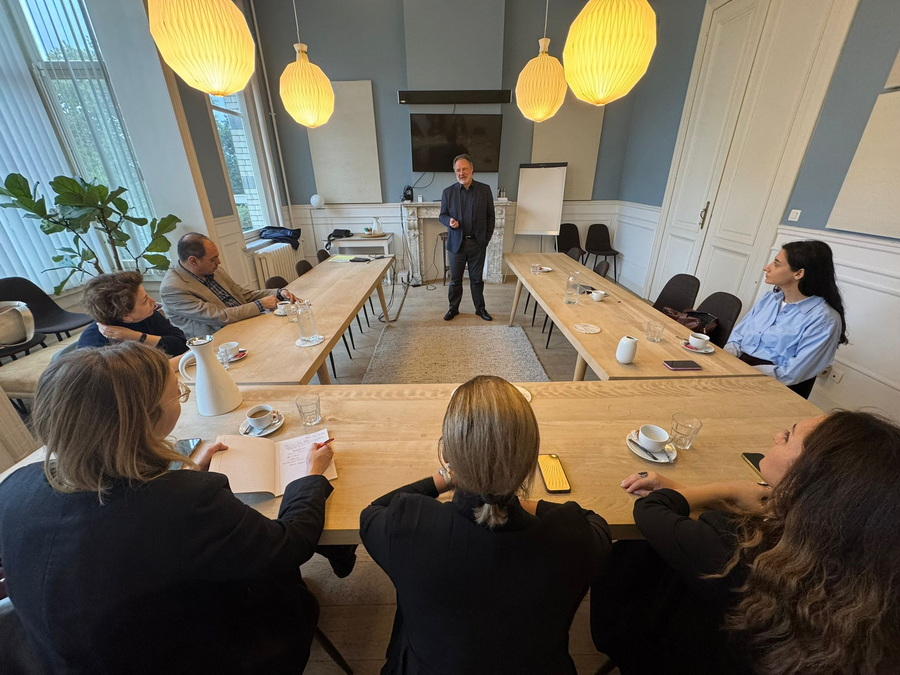Stephen Clark, who heads the European Parliament’s Directorate for Liaison Offices, oversees the network of the Parliament’s representations across the EU and works to strengthen communication between the institution and European citizens.
-What initiatives does your organisation have to produce reliable and fact-based information about the EU? What criteria or methods do you apply to ensure that your EU-related content is trustworthy?
Read also
-We believe that our status as a European institution means that we are particularly well placed to provide the public with trustworthy information concerning EU affairs through our various communication channels. We use for this purpose our Internet site, various social media platforms, and a wide range of documentation distributed both online and through physical means. As concerns the media, we employ numerous press officers both at headquarters and in the member states, who are able to brief journalists both individually and collectively on EU affairs.
Our EU content is, we believe, trustworthy by definition as it emanates directly from an EU institution itself. We have internal mechanisms to ensure that our content is fact-based and reliable. We are obviously attentive to the professional qualities and profiles of those working in our organisation.
-In your view, what are the key factors that shape public trust toward the EU, and what steps do you take to strengthen those factors? Do you run specific programmes or partnerships aimed at deepening trust in the EU?
-Like any public institution, the EU will be judged to a large degree by what it does, and it is therefore important to us to explain clearly the actions and decisions taken by the European institutions. In the case of the European Parliament, transparency is an important part of its democratic values, which means that we endeavour to ensure that the work of the institution is open to the public in general through all possible channels and that citizens are aware of their ability to engage with Members of Parliament.
The most problematic issue faced by the Parliament and by EU institutions more broadly is that of misinformation from those [who are] hostile to the European Union. Such misinformation frequently plays upon misconceptions, ignorance, and prejudice about the EU. It relies on emotive, non-rational communication. It is therefore important for us to also be able to engage audiences with more emotionally powerful messaging, largely centred around our shared values as Europeans, as well as to counter disinformation by all means possible.
We see Parliament’s communication efforts as being linked closely to the principle of democratic accountability. Citizens have a right to know what is being done by their elected representatives and the impact their decisions have on their lives. This is the fundamental basis of trust between citizens and the Parliament. However, specifically within the broad definition of communication, there are many programmes through which the Parliament seeks to engage with specific audiences, for example, an outreach programme for schools and young people covering schools across the territory of the European Union.
-How do you create and disseminate positive narratives and stories about the EU? Which platforms or media tools do you use most effectively to reach audiences with these stories? Could you share examples of projects that have successfully contributed to a more positive perception of the EU?
-It is not necessarily our job to create “positive” narratives if this is taken to imply that all actions and decisions of the EU are necessarily welcomed by everybody all the time. In a pluralistic institution, the institutional communication service seeks to achieve maximum transparency as to the process and foster engagement with the democratic institutions of the EU. It is therefore more a case of explaining than justifying the actions of the EU and illustrating the impact that Parliament decisions have on people’s lives. Nevertheless, the communication department of the Parliament will actively propagate a positive message when it comes to fundamental European values: democracy, freedom, tolerance, etc.
Parliament seeks to be where the audience is and therefore aims to be present in all forms of media and other communication channels where its audiences can be reached. Traditional media, as well as new digital media, are thus an extremely important channel, as are our social media platforms, through which many citizens obtain their news and information. Periodically, the Parliament carries out information campaigns, for example, to encourage participation in European elections, and these are always diverse multi-channel campaigns, including media, social media, events, out-of-home advertising, and so on.
In the liaison offices of the European Parliament, we are particularly proud of our European Parliament Ambassador School Programme, in which some 2,500 schools currently participate across the EU. With the help of teachers in these schools, we seek to engage young people in thinking about the European Union and how it affects their lives, and indeed how in the future they can engage with the democratic process. This programme has also allowed us to bring together thousands of young people both in Brussels and Strasbourg, and in other locations around Europe, allowing them to meet their peer group from other European countries and to learn about the possibilities offered by the European Union to young people like them.
-Does your organisation have a strategy to consistently present a reliable and positive image of the EU? What innovative approaches or media formats have you used to engage younger audiences or social media users?
-The communication strategy of the European Parliament is guided by its political authorities on proposals submitted by the communications department. This is in essence based on four levels of communication.
First, it is vital to ensure access for citizens to the operations of the European Parliament. This is achieved through, for example, an extremely rich website containing all possible documentation and indeed live streaming of all committee and plenary meetings. It also includes the possibility for citizens to visit the Parliament and see it in action with their own eyes.
Second, it is important to explain to citizens the operation of the Parliament, which is in many ways an unusual body, not yet embedded in national life and thus familiar to citizens in an automatic way. We therefore put significant effort into illustrating and explaining what happens in the European Parliament, doing so in all the official languages of the EU, as well as, for example, maintaining close relations with journalists and media, facilitating their access to the Parliament, to members, and to the facilities of the Parliament.
Third, the communication services are regularly instructed to communicate various messages on behalf of the institution, the prime example being the campaign implemented ahead of the European elections in order to impress on citizens the importance of voting in the elections.
Finally, Parliament’s communication services increasingly strive to encourage engagement of citizens with their Parliament, putting them in touch with members of the institution and providing opportunities for them to express their views on European affairs.
The Parliament was the first European institution to actively engage on social media platforms back in 2008. Since then, it has consistently endeavoured to innovate in the field of communication by following the trends in the wider world of communication.
Currently, a great deal of effort is going into the activation of multipliers and other partners who can help ensure that Parliament’s messages reach wider audiences, who would not necessarily engage with the communication channels of the institution itself. For example, we are working with content creators active in many fields in order to encourage them to themselves communicate on European affairs.
-Much has been said about disinformation and debunking. How do you see the balance between countering disinformation and proactively building a positive and reliable image of the EU? Do you take preventive action of spreading trustworthy and positive content before disinformation starts circulating?
-Like many public institutions attempting to fight disinformation, we are aware that attempting to debunk or deny all possible disinformation is probably a hopeless and even sometimes counterproductive task. Of course, we strive to identify and head off misleading narratives where possible, but ultimately the best way to deal with the scourge of disinformation is to, first, help create a culture of media literacy whereby citizens can themselves immunise against disinformation, and, second, to develop a powerful, reliable, truthful, and engaging narrative which will ultimately prove stronger than that of those peddling misinformation.
Anna ISREALYAN
The article was prepared within the project “Assisting independent media and CSOs in enhancing the access to reliable information on the European Union and EU enlargement on social media in Armenia”.
The project is being implemented by the Public Journalism Club in cooperation with EUROPEUM European Policy Institute funded by the Ministry of Foreign Affairs of the Czech Republic (Transformation Promotion Programme)․






















































